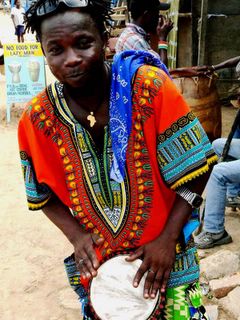
No Food For Lazy Man

No Food For Lazy Man
In the background the sign reads: "No Food For Lazy Man" (if you click on the picture you can see it full size). It looks to me it's a drum merchant and I'm probably don't "get" it, but like it nonetheless. The photo is from uploaded photos of a Washington DC drum circle. The idea of drumming all over the world puts me in a good mood.
When I first got online, a really late adopter, some of the posts really shocked me, extrodinarily harsh and down-right mean posts. One of our friends was a regular poster to newsgroups. I might have avoided newsgroups altogether if I hadn't rather innocently Googled my friend's name and discovered about a million flame attacks. How could people say such things about my sweet and lovely friend? So I had to find out. It turns out she gives as good as she gets; make that better because she's adept with logic and rhetoric, so a good percentage of the time her targets aren't even aware what fools she's made of them. Online orneriness is an acquired taste, and while I don't like it very much, I'm kind of used to it now.
Ethan Zuckerman's blog My Heart's in Accra is recommended. There is so much to say about Zuckerman; certainly he's someone finding out more about, for example look at Geekcorps. For now my attention is directed at something more banal. He posted yesterday about a segment on This American Life complaining about the first segment of episode 302. Here's the precis from TAL's site:
Act One. Not Just Tourists, Tourists Who Care. Chris Tenove had this idea – he thought could really make a difference for people in the developing world. The thought was to bring well-meaning tourists where their money would do the most good, spend some time with the locals, and then leave behind a little money to help out. To see if his idea has any merit, Chris decided to try it out. By himself. In Sierra Leone.In a very cordial "rant" to the producer Ira Glass Zuckerman wrote:
[Y]ou (Glass) and Tenove managed to reinforce the majority of stupid Africa stereotypes I’ve encountered in 12 years of working on African issues and periodically living on the continent.Say what you will about Zuckerman, but he's nothing if not kind. And he's got a good point about the program segment. Nevertheless, his post triggered something that troubles me and that's all the mean speech on the Web.
I know there's little I can do about that, and ranting at meanies is exactly a negative example. Still,mean speech can be quite frustrating, and it's something I worry about a lot in terms of promoting more voices from the developing world--more African voices--something Zuckerman is so productively engaged. I was encouraging my recent Tanzanian contact to participate in discussions more. His reticence is in part, I believe, that English is not his first language, and he doesn't want to be made to feel foolish. This situation has come up with some of my online friends and my reaction are: a) what a senseless waste of time, and b) I feel like strangling the suckers.
There are a number of organizations who collect used bicycles here in the U.S. make them as compact as possible to fill containers to ship to Africa. Usually these programs also include bike tools and other items to support programs on the ground in Africa. Bicycles are very important in Africa and the developing world, but many people involved in promoting pedal-power transportation in the developing world absolutely loathe such bike programs. The solid arguments include that the non-standard tire sizes tend to make too many of them useless junk, the bikes aren't built for the terrain, and new bikes of the standard sort are almost as cheap to import. But what really infurriates the critics of the used bike program is their belief that it's all about the donors "feeling good" for nothing. There's a reasonable dispute, but in following various lists about bikes the intensity of the criticism bites.
When people try to create something good, our attempts are so often funky. Parent's are often bemuzed when their kids around third grade stop drawing lovely pictures. Often the blame goes to the schools and the thought that schools are draining the last drop of creativity out of their kids. I think it's a bit more complicated. Kids at that age want to make their pictures look more like the real world. They are struggling to gain compentency, so their laments of "I can't draw" are really an opportunity to teach them some useful techniques. They're ready to learn, if we're ready to listen.
One of the great problems with an approach towards dialog with invividuals in developing countries who are trying to develop solutions to local problems is learning to listen. That involves coming to know about the context of our lives, and that takes time. It also involves missteps and misunderstandings that are best overcome with a presumption of goodwill.
My points are: don't be scared of meanies and don't be a meany. It helps me to remember being about eight and trying to figure out how to draw a cube and color within the lines. We can create something good and most of the time our attempts will fall somewhere below our expectations. The way not to become too discouraged, or so discouraged as to stop trying, is to keep in mind "the quality that cannot be named" as Christopher Alexander talks about it; it's somewhere in the "good" of create something good.
No comments:
Post a Comment